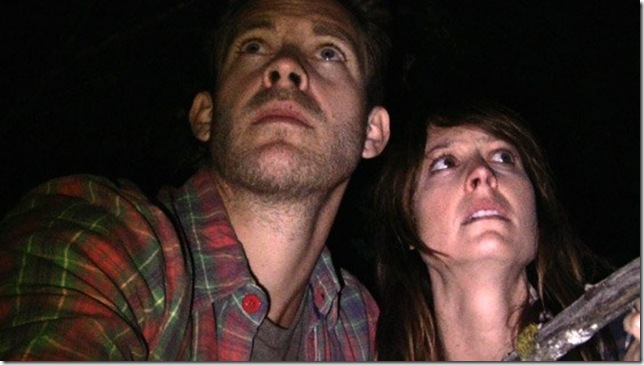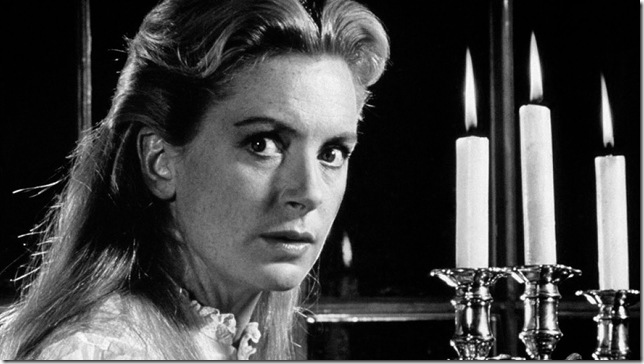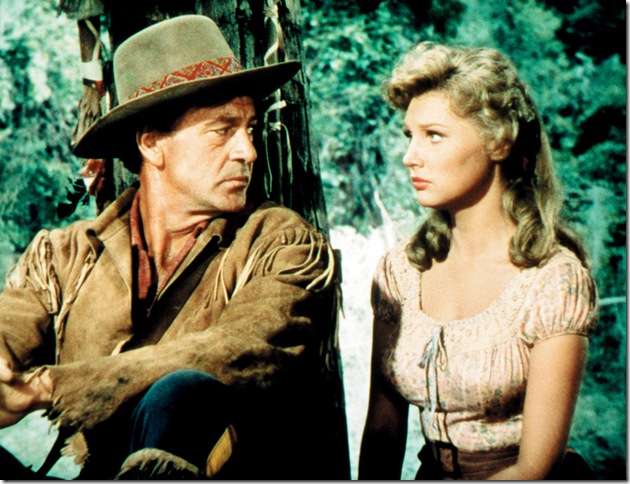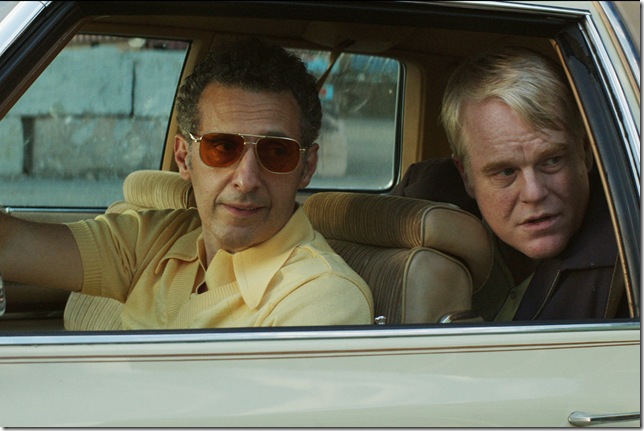Willow Creek: Comedian turned cult-film provocateur Bobcat Goldthwait directed this found-footage suspenser (Dark Sky Films, $29.98 Blu-ray, $24.98 DVD) in which Jim and Kelly (Bryce Johnson and Alexie Gilmore), a young, attractive and witty couple, attempt to retrace the treacherous steps of Roger Patterson and Robert Gimlin, who reportedly shot the country’s most-famous Bigfoot footage, back in 1967 in California’s Trinity National Forest. Jim captures his quest on video for a potential amateur documentary, interviewing several real-life Bigfoot researchers, enthusiasts and witnesses, blurring fact and fiction with amusing affection.
The Bluff Creek/Trinity Forest area has long milked its affiliation with Bigfoot, much as Roswell, N.M., has commercially exploited its UFO connection, and Goldthwait’s film, endearingly shot on location, offers a tour through kitschy Bigfoot country and a brief history of the mythical creature before the terror takes hold in the movie’s climax. On the downside, Jim and Kelly aren’t the freshest of character types, settling quickly into familiar gender roles: he the infantile male with poor judgment and an inflated ego, she the long-suffering rationalist who would rather be sitting in the comfort of a Starbucks than traipsing through a wilderness.
But Goldthwait clearly cares for his creations, and so do we, enough to cling to our seats during the film’s thrilling finale in the forest, an encounter made all the more terrifying for its lack of blood, gore, special effects and musical score. A creepy sound design, some admirable long takes, and committed performances are all it takes to sell the scenes, which, in an era of splatterful horror overkill, is a miraculous achievement. Too bad, as with most of Goldthwait’s dark and inventive comedies, that hardly anybody will see it.
The Innocents: British director Jack Clayton’s 1961 adaptation of Henry James’ The Turn of the Screw (Criterion, $31.96 Blu-ray, $23.96 DVD) is gothic horror par excellence, an expressionistic and deliberately ambiguous monochrome nightmare. If you’ve read the novel or seen the stage play, you know the story: a carefree bachelor hires a selfless governess to oversee his adopted nephews in an English country estate. But the children aren’t the enchanting angels they initially appear to be, and the lugubrious manse proves to be a clearinghouse for restive spirits.
Familiarity with the source material won’t dilute the film’s chills one bit. Precognitions, possession and full-bodied apparitions are among the movie’s delirious supernatural conceits, conveyed by Clayton and cinematographer Freddie Francis through a sustained atmosphere of palpable terror. The pins-and-needles musical score is deployed only sparingly, with the film’s sinister ambience mostly attributable to its dense sound design — the metronomic ticking of a grandfather clock, the creaking doors, the echoing footsteps, the unaccountable cries and whispers. Some of the visual touches are just as extraordinary, from the eerie superimpositions to such shocking images as a cockroach crawling from the mouth of a mutilated garden angel. Also, the calculated use of shallow and deep focus photography provides and betrays information across Clayton’s precise CinemaScope frame, making the mansion seem even more like a cavernous prison. James’ authorial signature is present throughout, but so is that of commissioned co-screenwriter Truman Capote, the architect of the movie’s combination of haunted house, madhouse and hothouse.
The Criterion release includes an audio commentary and visual introduction by cultural historian Christopher Frayling and a 2006 featurette on the making of the movie. The transfer, by the way, is crisp and stunning: As always with Criterion, you get what you pay for.
Ivory Tower: Andrew Rossi, the director/producer behind 2011’s excellent Page One: Inside the New York Times, returns with his latest thoroughly engrossing expose: a cost-benefit analysis of higher learning, especially on the Ivy League level. Ivory Tower (Paramount, $27.98 Blu-ray, $19.78 DVD) is filled with alarming statistics, some of them well publicized (student debt has reached more than $1 trillion), others truly shocking (44 percent of students fail to graduate in six years, let alone four).
Rossi and his talking-head researchers paint a picture of skyrocketing tuition and administration costs, vastly diminished federal funding, needlessly extravagant university amenities, and a toxic atmosphere of prestigious one-upmanship. These issues combine to form the persuasive argument that college has become a business and students have become consumers, forced to buy products they can’t afford if they can ever hope to make a living in the future.
But unlike a lot of documentaries, Rossi’s movie isn’t a doom-and-gloom advocacy thesis. He understands the paradoxes and complexities of obtaining a university education, which is still as much a beacon as a shackle. He finds inspiration in the eccentric outliers that prove the rule, such as Spelman, a historically black college; Deep Springs, an off-the-grid communal men’s school where students learn about Hegel and Nietzsche one hour and milk cows and bale hay the next; and San Francisco’s UnCollege movement, spearheaded by libertarian entrepreneur Peter Thiel as a middle-finger salute to the university establishment.
Best of all are Rossi’s intermittent visits to Cooper Union, a historically free private university in New York that broke tradition in 2013 by announcing that it would charge tuition to offset losses that included unwise investments in hedge funds prior to the 2008 economic collapse. A clutch of student protesters staged a sit-in inside the president’s office, an “occupation” that lasted 65 days — democracy in action. These scenes not only offer a glimmer of hope for the latest generation of activists; they’re also cinematically suspenseful.
Distant Drums: Adventure-film maestro Raoul Walsh directed this 1951 Western (Olive Films, $27.15 Blu-ray, $20.28 DVD), which covers a familiar genre in an unusual locale: It’s soldiers-and-Indians war games in the wilds of the Everglades and Lake Okeechobee. The Florida wilderness, pictorial but uncharted, becomes arguably the main character in the film, as unorthodox Capt. Quincy Wyatt (Gary Cooper) disembarks from his off-the-grid chickee hut to lead a 40-man squadron into deadly Seminole territory. A strategic blunder soon forces them onto the endless River of Grass, a treacherous journey where death lies around every corner, whether it be from an Indian’s arrow or a gator’s mouth.
Structurally and geographically, the film has a faint Herzogian undercurrent, though in this case the seemingly hopeless warriors find romance, not madness, and the movie strains credulity to ensure a happy ending is enjoyed by all — except for the Native Americans, of course, who must endure the standard ethnocentric racism of the period (“These Injuns smell a little gamey, captain,” says one character, referring to the good Indians).
But if the script isn’t the finest piece of Hollywood formula Walsh has been dealt, his ability to generate suspense and kinetic movement provides his signature. Many of the scenes, likely shot day-for-night, have a crepuscular moodiness that sets the movie apart from most sunbaked Westerns, and the climactic underwater knife fight is a bravura touch — one that, like the film’s best moments, is site-specific to our fair state.
God’s Pocket: The main character in co-writer/director John Slattery’s God’s Pocket (IFC, $27.98 Blu-ray, $15.26 DVD) is the titular neighborhood: a hardscrabble asphalt jungle in South Philadelphia in the early ‘80s, whose residents weed out their weakest members in Darwinian fisticuffs. It’s a place where the only jobs involve dirty hands and dirty meat, and the only leisure time is spent at the local watering hole, where bartenders shout things like “I’m cuttin’ you off!,” and where splotchy-faced drinkers yell back, “You can’t cut off the truth!”
Eventually, drama emerges: a young, racist loose cannon at a construction site (Caleb Landry Jones) says the wrong thing at the wrong time. A crime is covered up, a funeral proves difficult to pay for, the wrong horse wins at the local track, shots are fired, eye sockets are exposed. The pitiful menagerie of lost souls involved in extenuating these tragedies include the boy’s stepfather (Philip Seymour Hoffman, all protruding gut and melancholic eyes), his meatpacking employer (John Turturro), an unscrupulous funeral director (Eddie Marsan) and an alcoholic newspaper columnist (Richard Jenkins).
The film garnered a tepid critical reaction during its microscopic theatrical release, but it’s more competent than its reputation. The picture is chockablock with formidable actors, and it’s always a pleasure to watch them work — and in Hoffman’s case, a posthumous privilege — while Slattery directs a number of genuinely gasp-worthy moments. Still, while this depressing slice of urban tribalism has a schematic structure, it lacks a grand vision, so the endeavor ultimately feels a bit pointless; it’s exciting to ingest in the moment, but the calories are empty.




